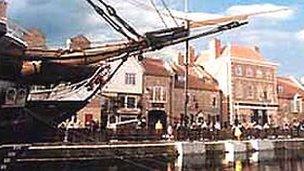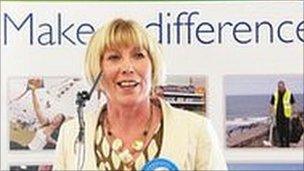Directly elected mayors fall foul of councillor power
- Published
- comments

Stuart Drummond was football mascot H'angus the Monkey when he was first elected as Hartlepool's mayor
The government is currently selling the benefits of elected mayors to communities up and down the UK.
They tell us cities and towns will benefit from having a single powerful figure in charge.
But this week two existing elected mayors are discovering the limits of their powers.
Hartlepool's mayor has seen his budget proposals overturned, and North Tyneside's mayor is facing the same prospect.
Limited powers
The difficulty for these mayors is that they are not actually all-powerful, as they still rely on support from other elected members.
Firstly, they need to form a cabinet made up of councillors.
Secondly, they must also get the support of at least a third of the council chamber to push through a budget.
When that falls apart, mayoral powers become much more limited.
That's what Hartlepool's directly-elected mayor Stuart Drummond, external has discovered in the last week.
He won the job unexpectedly, external when he stood as the town's football mascot H'angus the Monkey in 2002.
Since then he's dumped the monkey suit and been re-elected twice, external.
As an Independent he cannot rely on the support of the main political parties, but he's had a largely trouble-free 10 years by chairing a cabinet made up of councillors of all political persuasions.
All that has fallen apart though.
Labour counter proposals
He has just lost a vote on his budget at full council after six Labour members of his cabinet failed to turn up to support him.
Instead Labour counter proposals won the backing of more than two thirds of councillors and Mr Drummond will now have to implement them.

People in Hartlepool could be asked to decide later this year whether they still want an elected mayor
His response has been to sack the six missing members from his cabinet.
He told BBC Tees: "I did this with a heavy heart, but the six of them did not show up at the meeting to support the cabinet's proposals.
"For that reason they did not get through and now we have to work with a budget that the rest of us in the cabinet are not happy with. I felt I had no choice.
"I believe they were given an ultimatum by the Labour party to oppose the cabinet proposals or face being thrown out of the party, so they were in a very difficult position."
That last claim has been denied, external by one of the sacked cabinet members.
Cllr Ged Hall told BBC Tees that there was no threat of suspension, although he admitted it could have been a possibility.
He insists the Labour councillors were acting in the best interests of Hartlepool though.
He said: "I understand why he took the decision (to sack us) but I do not believe it was the right one.
"Some alternative budget proposals were made at a late stage and it is up to us to decide what's best for everyone in Hartlepool.
"This budget was voted for by Labour, Conservative, Liberal Democrat and Independent councillors and so actually it's Mayor Drummond who is isolated."
Two jobs
Stuart Drummond has decided not to replace the cabinet members before May's local elections.
Ged Hall believes that is a mistake.
He said: "People are saying in the town that he is taking on two jobs, one as elected mayor and another as chair of Cleveland Police Authority. Now he seems to be planning to do the job of six cabinet members too.
"People are entitled to ask how he can manage all that."
There does certainly seem to be some politicking going on in Hartlepool.
In May the whole council is up for re-election, and later this year the town could have a referendum on whether to retain a mayor, external.
Even if the town decides it still likes the idea, Stuart Drummond (if he decides to stand) will face re-election next May.
Labour will hope it has a real chance of unseating Stuart Drummond after more than a decade and replacing him with a Labour mayor.
Checks and balances
North Tyneside's Conservative mayor Linda Arkley, external faces a similar threat from Labour councillors.
Her cabinet is made up entirely of Tory councillors, but the Conservatives don't have the votes in the council chamber she needs to get her budget through.
That means Labour will be able to amend Ms Arkley's budget if it can get the support of the Liberal Democrats. Labour is cautiously optimistic it can do that.

North Tyneside mayor Linda Arkley could also see her budget overturned by Labour councillors
So does all this mean the mayoral system is failing by leaving mayors powerless to implement what they want to do?
Maybe, but you can also argue that this is exactly how it's supposed to work.
The checks and balances holding back Stuart Drummond and Linda Arkley were put in place by Tony Blair's government when it first introduced elected mayors in 2002.
They were designed to prevent a mayor riding roughshod over all political opposition on the council.
They force mayors to work with at least a sizeable section of councillors. Without their support, their powers become more limited.
And that does seem reasonable. After all those councillors also have an electoral mandate to represent the community.
Ultimately it will be up to voters in places like Hartlepool and North Tyneside to decide who has acted in the best interests of the town.
But this week's events show that at a time when all the talk is about powerful elected mayors, from time to time humble councillors can still flex their muscles.